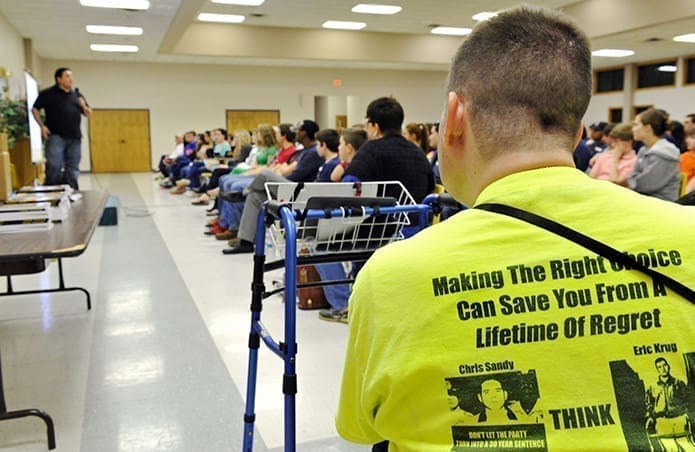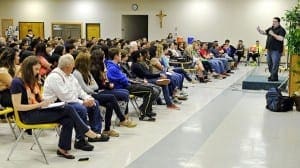 Photo by Lee Depkin
Photo by Lee DepkinConyers
Drunk driving victim, offender, tell stories of how separate accidents intersected their lives
By LINDSAY WOOD, Special to the Bulletin | Published April 3, 2014
CONYERS—An unlikely pair of brothers-in-law shared the story of their meeting with over 100 people at St. Pius X Church in Conyers on March 2.
But it wasn’t a happy story.
It was one about enduring regret and the ripple effect of drunk driving.
On the night of his 21st birthday, April 11, 1997, Eric Krug, now 37, made a decision that changed his life forever.
He stepped out of a taxicab in Atlanta and into the car of his best friend’s girlfriend. No one could have told him that by doing that, he would lose the ability to speak, walk normally and care for himself.
The driver made it onto the Oglethorpe University campus, where Krug and his friends lived, but crashed into a tree before reaching the dormitories.
Krug was thrown through the windshield and slammed into a tree head first at approximately 45 miles per hour. His right arm was nearly severed at the elbow. His skull was fractured twice, and Krug lapsed into a coma from traumatic brain injury on the scene.
His best friend, Tim Crowley, died 10 hours later from extensive injuries.
During the 16 years he went from hospital bed to wheelchair to walker, Krug has endured depression and has “not been on a real date in 16 years.” He’s had some triumphs too—like walking his sister down the aisle when doctors told him he would probably never walk again.
Krug believes that all this has happened for a reason though, and doesn’t live life feeling sorry for himself.
“I never try to remove Jesus from my life,” Krug said. “I figure he saved me for something, now it’s my job to find it.”
‘There is a fatality’
Three years later on April 11, 2000, 22-year-old Chris Sandy was partying with some friends, chugged four drinks and got behind the wheel of his car to go to the next party.

Chris Sandy speaks to teens and families at St. Pius X Church, Conyers, on March 2. He served over eight years in prison for causing a DUI accident, which killed an elderly couple. In a program called “Enduring Regret,” he now tells his story in an effort to prevent others from experiencing such sorrow and tragedy. He speaks with Eric Krug, who was severely injured as a passenger in a separate accident. Photo by Lee Depkin
Sandy was driving down a country road in Newton County outside of Atlanta when he pushed the accelerator down to pass a car in front of him. He moved over the double yellow lines at 77 miles per hour into the left lane. In a matter of minutes, another car approached Sandy’s, but he didn’t have enough time to redirect from the oncoming car with elderly couple Nellie and William King inside.
He hit the Kings’ car full force, ripping it into two pieces.
Sandy was trapped between the windshield and his dash with his right leg dislocated at the hip.
He was in shock from the pulsating pain ripping through his body with every breath, but he heard the seven words that would affect the rest of his life: “There is a fatality on the scene.”
Sandy killed the Kings, and later was arrested and charged with two counts of vehicular homicide by DUI. He spent the next eight and a half years in a maximum security prison.
“I hate waking up each day knowing what I did,” Sandy said. “And I know there’s nothing I can ever do to change what I did. We do believe that God plays a significant role in everything that has transpired in our lives right now. It’s a miracle in itself, although in that miracle there are some very, very tough hardships.”
‘Never go through what I have’
On this night at St. Pius X Church, Krug is decked out in neon yellow—his favorite color—and black from head to toe. Even the walker he leans on to support himself while he walks has two neon yellow tennis balls stuck to the bottom of the walker’s legs. A basket attached to the walker holds his iPad, Krug’s primary form of communication.
Since his traumatic brain injury, Krug has short-term memory loss and limited use of his right arm. He uses his left for nearly everything, including typing his thoughts on his iPad using a program called Speak It.
When asked why he endures speaking about his injuries to hundreds of people a year, Krug typed the word “publicity,” and let out a loud laugh. The jokester pressed delete, then typed again that he wants to help others “learn not to do the dumb thing I did cause I want everyone to never go through what I have.”
His face changed from a smile to sadness while he brought his hand to his chest where a chain holding a St. Christopher medallion and a crucifix rested.
Sandy approached Krug with the protective sense of an older brother, despite being a year younger than Krug.
They met in 2006 while Sandy was incarcerated. Sandy was speaking to a school in Atlanta as part of a program for inmates when he first met Krug and his mother, Joyce. Since then, they’ve teamed up to bring their different messages to audiences all over the country.
Friendship brought hope
That night they shared their experiences in front of a group of high school students in the parish Life Teen program.
“I don’t know how anyone in this room would feel about standing up in this room in front of everyone and telling them about their biggest mistake in life,” Sandy said to the audience. “You see because of my choice there are two wonderful people no longer here. They’re dead because of what I did.”
His voice trembled as he told the students about the 3,017 days spent behind bars, about the couple he killed, and about the regret he faced every single day.
During his eight and a half years of incarceration, Sandy’s father and grandmother died. Each day he felt like he “was about to lose it.”
“In such a dark and negative place (God) actually gave me some hope,” Sandy said of his time served. He’s on probation until 2031.
That hope came in the form of Krug and the promise of better days to come through their friendship. One of those promises fulfilled was in Sandy’s marriage to Krug’s sister, Jennifer.
“Eric has this spotlight on him,” Sandy said. “He’s able to find laughter in every situation. He’s somehow able to make the best come out of people.”
When Krug took the stage, he lit up, ready for the spotlight. His iPad spoke for him and told the story of his daily struggles.
“Suffering from a traumatic brain injury has crushed all of my dreams like playing professional baseball or completing my college degree,” Krug said. “Now this is my never-ending nightmare that began on my 21st birthday.”
Then the lights dimmed and the song “The Dance” by Garth Brooks came over the loud speakers for Krug’s video, called “It’s Still My Life.” Photographs of Krug’s years as a baseball player and his physical rehabilitation struggle flashed across the screen. The photographs represented the victim’s side of drinking and driving and reminded the crowd that drunk driving doesn’t only affect the people who do it.
Krug looked back into the audience, his face full of emotion that he couldn’t articulate.
‘You think you’re invincible’
The presentation was a powerful witness to the audience of young people.
Sarah Greer, 18, was visibly moved by what she saw and heard.
“Chris Sandy’s talk definitely inspired me,” she said. “I hope that he keeps going around and telling his story with Eric. I will definitely continue to reach out to my friends and encourage them not to drink.”
Adults also came away with a new perspective on the impact of drinking and driving.
Life Teen volunteer and chaperone Paul Holles wasn’t afraid to admit that the program brought a tear to his eye.
“When you’re a teenager, you think you’re invincible,” he said. “You think nothing is going to happen.”
That’s exactly why St. Pius’s women’s jail ministry organizer Linda Jesky said she sponsored the free program—to save lives.
St. Pius X parishioner Philomina Nwokoro has two daughters, ages 16 and 14, who attended the talk with her.
“It was good for them to hear that the choices they make, especially when they take control, have positive and negative effects,” Nwokoro said. “For drinking and driving, that’s not acceptable because you can affect a person’s life in a negative way. That’s something that everybody should think about before they get in the car.”
For information on Chris Sandy, Eric Krug and their ministry, visit enduringregret.org.